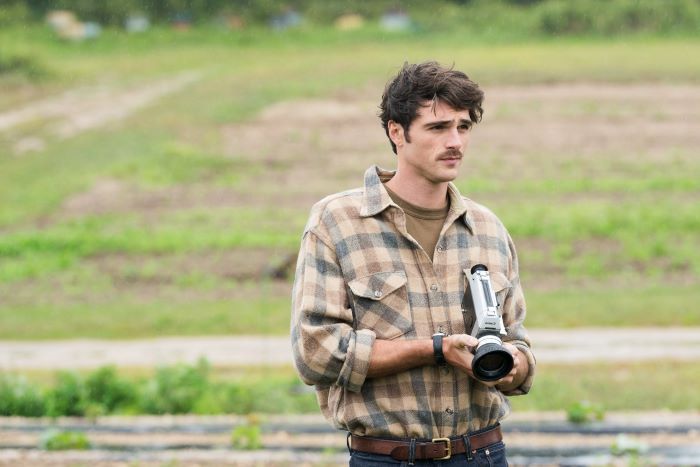![]() If death is the ultimate destination, does the life that precedes it become nothing more than a footnote? It is an extremely nihilistic view, perhaps, yet one that is hard to avoid when contemplating our fleeting existence and its inevitable end. It’s also logical that as an artist ages, their work may reflect an urgency to confront death, fully aware that any embellishment or escapism intended to soften its impact will prove futile. This grounded pessimism permeates Paul Schrader’s latest film, an adaptation of the late Russell Banks’s novel Foregone. Renamed Oh, Canada, the film serves both as a tribute to Schrader’s friend and, in part, as a self-reflection (though not autobiographical) on his relationship with cinema and his acceptance of mortality.
If death is the ultimate destination, does the life that precedes it become nothing more than a footnote? It is an extremely nihilistic view, perhaps, yet one that is hard to avoid when contemplating our fleeting existence and its inevitable end. It’s also logical that as an artist ages, their work may reflect an urgency to confront death, fully aware that any embellishment or escapism intended to soften its impact will prove futile. This grounded pessimism permeates Paul Schrader’s latest film, an adaptation of the late Russell Banks’s novel Foregone. Renamed Oh, Canada, the film serves both as a tribute to Schrader’s friend and, in part, as a self-reflection (though not autobiographical) on his relationship with cinema and his acceptance of mortality.
As director and screenwriter, Schrader, now 78, continues to delve into the most complex and dark aspects of human nature with unflinching honesty. He is, after all, the screenwriter of Taxi Driver and the mind behind Travis Bickle, the quintessential antihero. Alongside this exploration of humanity’s darker corners, Schrader remains preoccupied with redemption—a pressing quest for those brave enough to examine their consciences. Schrader’s Calvinist upbringing often imbues his work with a particular religiosity, and in his most recent decade of filmmaking, the agony of guilt-stricken characters seeking release has become palpable.
Typically, this spiritual crisis takes the form of a confession. The protagonists of his last three films (First Reformed, The Card Counter, and Master Gardener) express their turmoil through diaries. In Oh, Canada, Schrader departs slightly from this Bressonian conceit, exploring a different kind of interiority in which cinema becomes both the medium and the subject. Here, the diary is replaced by a recording camera, and the sinner’s spiritual storm is confessed aloud. It’s a dual act: intimate in its execution (a closed room with a handful of listeners close to the protagonist’s life) and intended as a spectacle for posterity as a documentary.
Leonard Fife (Richard Gere), a repatriated American living in Canada since the Vietnam War, has become a legend in documentary filmmaking. Now in the final stages of cancer, with little hope left, he spends his remaining days cared for by nurses at home, alongside his wife Emma (Uma Thurman), once his brightest student. Meanwhile, two former pupils, Malcolm (Michael Imperioli) and Diana (Victoria Hill), want to conduct an interview as part of a film about Fife’s life and work. Emma objects, warning her husband that Malcolm and Diana will control the narrative. Yet Leonard sees beyond their intentions, recognizing an opportunity to—in Schrader’s fashion—examine his conscience in search of truth. He hopes to offer Emma, the love of his life, a way to understand everything he could never say directly: his past, his shame, and his failures. Fife insists he can only speak the truth when the camera is on.
Oh, Canada alternates between black-and-white and color, not strictly to distinguish narrative time frames but to separate objective reality from subjective experience. Dream states and evocations often merge, leaving the viewer to question the reliability of these distinctions. The film plays with the fragility of memory and its distortions; Fife’s perceptions are clouded by medication and physical suffering. Yet he is ready to bare his secrets.
In flashbacks to his youth in the 1960s, Jacob Elordi portrays young Fife, a university dropout aspiring to become a left-leaning writer, with a plan to move to Cuba that never materializes. Instead, a few years later, he finds himself in Virginia, married to his first wife, Alicia (Kristine Froseth), with one child and another on the way. When Fife’s visit to a friend in Canada—secretly a ploy to dodge the Vietnam draft—turns into a permanent stay and a new life, Fife never returns, abandoning his first family for good. His politically charged documentaries launch a remarkable career, but Schrader treats this success almost as a punchline, underscoring the futility of artistic legacy for a man burdened by regret. How repentant is Fife for his most condemnable actions? Notably absent from his on-camera recollections is a reunion with his now-adult son, Cornel (Zach Shaffer), at a film festival, where Fife cruelly rejects him. The script adds complexity by having Cornel narrate parts of the story.
While it’s tempting to view Oh, Canada as a self-portrait, this interpretation is overly simplistic. Spiritually akin to Tolstoy’s The Death of Ivan Ilyich, the film dances around life’s ultimate mystery without seeking definitive answers, instead exploring the hope of finding meaning in life. The reunion of Gere and Schrader decades after American Gigolo is not only exciting but also provides Gere the opportunity to deliver one of his finest performances (though likely too understated and subtle for major recognition). Now in their twilight years, both director and actor channel their talents into a stark, somber work far removed from the seductive illusions of cinema. Continuing the remarkable streak of Schrader’s late-career output, Oh, Canada embraces the randomness of life over any notion of destiny, with little to relieve the certainty of life’s brevity.







Leave A Comment